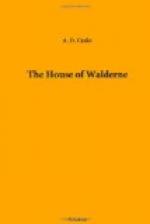“Thy vengeance?”
“Yes. If I live I shall expect to find all as I left it when I return hither. If I die, and thou receivest sure news of my death, slay me the three prisoners.”
“What! The friar and all!”
“Is his blood redder than any other man’s? It seems to me thou art afraid of the Pope’s gray regiment.”
“Nay, I like not to slay priests and friars. It brings a man ill luck if he meddle with those.”
“Then I must appoint Thibault. He may have an easier conscience, but I had thought that bloodshed, if nothing else, had bound us together.”
“Nay, it shall not be said that I forsook my lord in his need. If thou fallest in the coming battle, I will sacrifice the three to thy ghost.”
“So shall I rest in peace, like the warriors of old time, over whose tomb they slew many victims and cut many throats. I believe in no creed, but the old one of our ancestors suits me best, and I hope I shall find my way to Valhalla, if Valhalla there be.”
When the last stragglers of the royal army had been swallowed up in the recesses of the forest, Marboeuf began to ponder over his engagement. But presently up came the janitor of the dungeons.
“Hast thou the key of the friar’s dungeon?”
“Nay. The young lord has not left it with me.”
The men looked at each other.
“He locked it himself, this morning, and put the key into his gypsire.”
“And he has gone off with it. Doubtless he will send it back directly he finds it there.”
“I doubt it.”
“Shall we send after him?”
“No!” said Marboeuf.
“He is a friar. We must not let him starve.”
“Humph! It will not be our fault. I tell thee thou dost not yet know our lord, and too much zeal may only damage you in his goodwill.”
The gaoler retreated, and went slowly down to the dungeons. He walked along the passage moodily. At length he heard a voice breaking the silence:
Yea, though I walk
through the valley of the shadow of death,
I will fear no evil: for thou art with me;
Thy rod and thy staff they comfort me.
The man felt moved. It seemed to him as if he were near a being of another mould, and old memories of years long past were awakened in his mind—how once such a friar had found him wounded almost to death in the battlefield, and had saved the body, like the good Samaritan, and striven to save his soul. How he had vowed amendment and forgotten it, or he had not been found herding with such black sheep as Drogo and his band. And earlier thoughts, how when his mother had fallen sick of the plague, another friar had tended her dying moments, when every other earthly friend had failed her for fear of infection.
“He shall not perish if I can help it, and it may be put to my account in purgatory.”
“Father,” he cried.
“My brother,” was the reply, “what hast thou to ask?”




